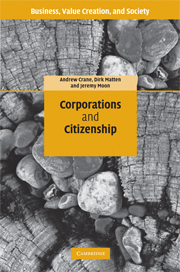Book contents
- Frontmatter
- Contents
- List of figures
- List of tables
- Foreword
- Preface
- Acknowledgements
- 1 Introducing corporations and citizenship
- Part A Corporations and citizenship relationships
- Part B Corporations and citizenship reconfigurations
- 5 Citizenship identities and the corporation
- 6 Citizenship ecologies and the corporation
- 7 Citizenship, globalization and the corporation
- 8 Conclusion
- References
- Index
5 - Citizenship identities and the corporation
Published online by Cambridge University Press: 22 September 2009
- Frontmatter
- Contents
- List of figures
- List of tables
- Foreword
- Preface
- Acknowledgements
- 1 Introducing corporations and citizenship
- Part A Corporations and citizenship relationships
- Part B Corporations and citizenship reconfigurations
- 5 Citizenship identities and the corporation
- 6 Citizenship ecologies and the corporation
- 7 Citizenship, globalization and the corporation
- 8 Conclusion
- References
- Index
Summary
Shake your conscience. Drink with commitment.
Mecca Cola advertising slogan, www.mecca-cola.com/en/index.php, July 18, 2007Introduction
So far in this book we have tried to map out main avenues of applying the notion of citizenship to corporations. There are some relatively consistent, well-established and robust understandings of citizenship in political science and political philosophy, which can be taken – as it were – from the shelf and examined with regard to their applicability to corporations. However, we have also noted the contingency and dynamics of citizenship. This is perhaps nowhere more true than when we turn to the identities that underpin or challenge citizenship.
The modern conception of citizenship as merely status held under the authority of the state has been contested and broadened to include various political and social struggles of recognition and redistribution as instances of claim-making, and hence, by extension of citizenship. As a result, various struggles based upon identity and difference (whether sexual, racial, ethnic, diasporic, ecological, technological and cosmopolitan) have found ways of articulating their claims to citizenship understood not simply as a legal status, but as political and social recognition and economic redistribution
(Isin and Turner 2003: 2).This relatively recent emphasis on citizenship reference frames other than that of the nation state has led to a broad debate on a variety of transformations in the nature of political communities.
- Type
- Chapter
- Information
- Corporations and Citizenship , pp. 125 - 148Publisher: Cambridge University PressPrint publication year: 2008

